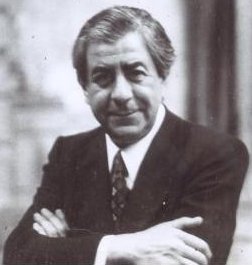| B i o g r a p h y |
 Pierre Cochereau (June 24, 1924–March 5, 1984), was a French organist, improviser, composer, and pedagogue.
Pierre Cochereau (June 24, 1924–March 5, 1984), was a French organist, improviser, composer, and pedagogue.
Pierre Cochereau was born in 1924 in Saint-Mandé, near Paris.
In 1929, after a few months of violin instruction, Pierre Cochereau
began to take piano lessons with Marius-François Gaillard.
Marguerite Long became his piano teacher in 1933, and three years
later, Paul Pannesay. In 1938, Cochereau was introduced to the organ by
Marie-Louise Girod, a student of Marcel Dupré. He continued his
organ studies with André Fleury and Paul Delafosse, whom Pierre
Cochereau succeeded as titular organist at St. Roch in Paris in 1942.
After one year of law studies, Cochereau decided to dedicate himself
to a musical career, and entered the Conservatory of Paris in 1943. He
left the Conservatory in 1949 with first prizes in harmony (class of
Maurice Duruflé), music history, fugue and counterpoint (class
of Noël Gallon), composition (class of Tony Aubin), and organ
(class of Marcel Dupré).
In September 1948, Cochereau made his first recital tour to Hungary.
One year later, he married Nicole Lacroix, a pianist and composer, with
whom he had two children: Jean-Marc, conductor and presently director
of the Orléans Conservatory, and Marie-Pierre, a professional
harpist.
In 1949, at age 26, Pierre Cochereau was appointed director of the Le Mans Conservatory, where he stayed until 1956. In 1955, he succeeded Léonce de Saint-Martin (1886-1954) as titular organist at Notre Dame Cathedral in Paris.
In 1956, his recording of Marcel Dupré's Symphonie-Passion
opus 23 was awarded the Grand Prix du Disque. The same year, Cochereau
made his first of 25 recital tours to the United States. In 1961,
Cochereau became director of the Nice Conservatory, which he left in
1979, accepting the directorship of the Lyon Conservatory. Pierre
Cochereau died during the night of March 5th, 1984, in Lyon, suffering
from a heart attack. He was buried at the Cimetière Belleville
in Paris.
Pierre Cochereau had a worldwide reputation as a concert organist and especially as a brilliant improviser. In his improvisations, Cochereau had created a musical language that was eminently personal, recognizable as of the opening notes. Stylistic influences regarding counterpoint, formal structure, and harmonic language, included composers such as Marcel Dupré, Maurice Duruflé, Noël Gallon, Olivier Messiaen, and Florent Schmitt. André Fleury, who was one of Cochereau's first organ teachers, reported, "He already showed great gifts, perhaps a bit overly attracted, in the study of improvisation, by the search for the pretty harmony, rather than the strict exercise of contrapuntal discipline." Many years later, Fleury said, "As one day we were en tête à tête, I asked him if he worked on improvsation. 'Never,' he replied. 'What I do at Notre-Dame and in concert serves as practice.' Such gifts, when one thinks of his harmonic language, so subtly refined, and what force of concentration to give a form to all those riches!" In regard to Cochereau's formidable improvisational skills, Marcel Dupré said about his former student, "Pierre Cochereau is a phenomenon without equal in the history of the contemporary organ."
As a composer, Cochereau left several organ works, chamber music, and choir compositions. Many of Cochereau's organ improvisations were transcribed and published by George C. Baker, Frédéric Blanc, David Briggs, Jean-Marc Cochereau, Jeremy Filsell, Jeanne Joulain, François Lombard, and John Scott Whiteley.
From Wikipedia, the free encyclopedia